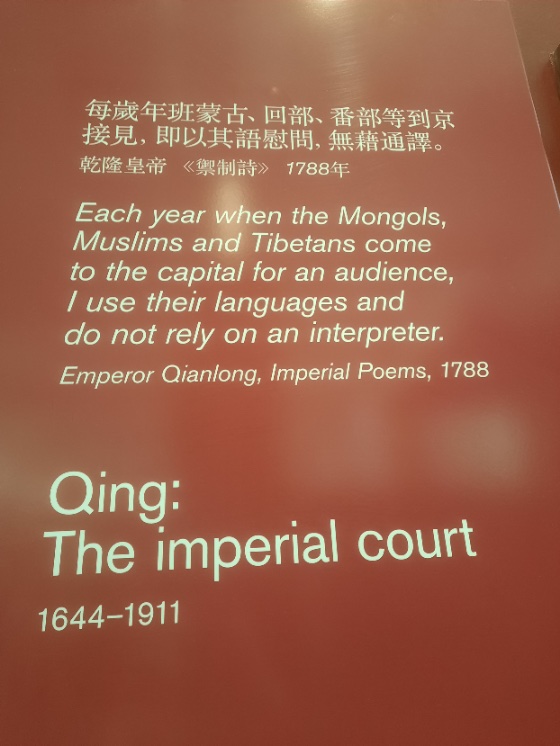English for Singapore
"Majority supports adding English requirement for applicants for Singapore citizenship: poll"
Pinyin News (4/6/23)
The opposition leader of Singapore, Pritam Singh, said in late February that he supported adding an English test to the requirements for applications for citizenship or permanent residency in Singapore. A recent poll of five hundred Singapore-born citizens found strong popular support for that position.
Proportionately, most of those opposing an English-language requirement were of Chinese descent. But even among that group, supporters of the requirement outnumbered those opposed by roughly 3:1.
Next up, English for Taiwan — unless Xi Jinping does something dramatic to halt the momentum.
Read the rest of this entry »
Mandarin with an English accent
Something very funny happened to me earlier today, funny enough that I would like to share it with all Language Log readers who may be desirous of something more than a cup of coffee to perk them up on a gray, midweek morning.
I entered the following Mandarin expression into Google Translate and wanted to hear it pronounced by the machine: 衷心感謝 ("heartfelt thanks"). So I clicked on the speaker button, but, by mistake, I had it set to English rather than to Chinese. What I heard was Mandarin with an English accent!
When set to Chinese, the machine pronounces 衷心感謝 properly and precisely: zhōngxīn gǎnxiè. When set erroneously to English, it sounds like an American reading out romanized Mandarin, with the "correct" suprasegmental intonation and all, but, of course, paying absolutely no attention to lexical tones. Amazingly, it's still understandable, which replicates the experiments my wife used to make by going up to strangers on American streets and asking them to read pinyin Mandarin to native speakers. She was always triumphant when the native speakers could understand most of what the English speakers were reading.
I had the machine read 衷心感謝 in French, Spanish, Italian, German, and other languages, and they all had their own special "flavor".
Read the rest of this entry »
Topical weather prediction
Weather outlook: MOSTLY STORMY on Tuesday. 😉 pic.twitter.com/qKcqZa6svL
— Jon Cooper (@joncoopertweets) April 3, 2023
Desultory philological, literary, and historical notes on Xanadu
Our previous post was on "Hallucinations: In Xanadu did LLMs vainly fancify" (4/3/23). If you were wondering where such an evocative, exotic name came from, it has a direct lineage back to the Mongol Yuan Dynasty (1271-1368) of China where it was called Shàngdū 上都 ("Upper Capital") in Mandarin, ultimately from early Mandarin ʂaŋ` tū. The first Romanized form comes from Marco Polo's writings in Italian as Shan-Du. In 1617, Purchas his Pilgrimage […] by Samuel Purchas was published in London, containing the phrase “In Xamdu did Cublai Can build a stately Palace” on page 472. This was the inspiration for Coleridge's poem which uses the spelling Xanadu. (source)
Location and basic history
Shangdu (Chinese: 上都; lit. 'Upper Capital'; Mandarin pronunciation: [ʂɑ̂ŋ tú]; Mongolian: Šandu), also known as Xanadu (/ˈzænəduː/ ZAN-ə-doo), was the summer capital of the Yuan dynasty of China before Kublai decided to move his throne to the former Jin dynasty capital of Zhōngdū (Chinese: 中都; lit. 'Middle Capital') which was renamed Khanbaliq (present-day Beijing). Shangdu is located in the present-day Zhenglan Banner, Inner Mongolia.
(source)
It was 220 miles (350 kilometers) north of Beijing.
Read the rest of this entry »
Linguistic nationalism news from Ohio, Italy, and California
Adam Schrader, "Ohio Sen. J.D. Vance introduces bill to make English official U.S. language", UPI 3/30/2023. A press release from Vance's office is here, and here's the text of the bill.
"Meloni's party looks to shield Italian language from foreign contamination", Reuters 3/31/2023.
Prime Minister Giorgia Meloni's party has proposed imposing fines of up to 100,000 euros ($108,750) on public and private entities which use foreign terms, most notably English, instead of Italian in official communications. […]
If the draft becomes law, the government might have to get its own house quickly in order. When it took office last October, it added the English term "Made in Italy" to the name of the industry minister, while Meloni herself occasionally drops foreign words into her speeches.
In her inaugural address to parliament as prime minister in October, Meloni described herself as an "underdog".
Read the rest of this entry »
Hallucinations: In Xanadu did LLMs vainly fancify
Bill Benzon has been our most prolific humanistic commentator about GPTs, almost as prolific as GPTs themselves. Here he introduces his latest creation in / on the genre:
"From 'Kubla Khan' through GPT and beyond", 3 Quarks Daily (3/27/23)
In a covering note to me, Bill writes:
A story about how I came to be interested in GPTs. It’s also implicitly a critique of the large language model business. You have a bunch of very smart and clever people creating engines that pump out language by the bucketful, but who seem to have little interest in or knowledge about language itself, much less linguistics, psycholinguistics, or the various cognitive sciences. It’s crazy. But the machines they’re producing are marvelous and fascinating.
Read the rest of this entry »
Invented Chinese name of an LA lawyer
Around 60% of the people living in the San Gabriel area are Asians, and the largest proportion among them are Chinese. To attract the business of the local population, attorney Scott Warmuth decided to put up Chinese billboards in Monterey Park about a decade ago. How it happened is described in this article:
"Column: Racial politics, attorney advertising and cultural communication in San Gabriel Valley",
Frank Shyong, Los Angeles Times (4/1//23)
Although the author, who grew up south of Nashville, Tennessee and who writes about diversity and diaspora, is Chinese, he doesn't say much about the linguistics of Warmuth's name choice, and some of what he says is misleading
Read the rest of this entry »
"Literally CVS"
In at least two recent interviews, Eric Trump has objected to his father's recent indictment by complaining about the lack of prosecutorial attention to the factors leading NYC drugstores (he says) to lock up Tylenol and Advil. On Fox News:
And this is a city — I spend a lot of time in New York —
that is falling apart. I went into literally CVS the other day
and you can't buy Tylenol because it's locked behind these
glass counters
And on NewsMax:
I went to Duane Reade the other day
and literally you can't buy Advil in Duane Reade
without having somebody come up with a key and unlock
you know those little plastic things that you pick up
Read the rest of this entry »
Three negations in one headline
Anti
Read the rest of this entry »
"An exercise in inference sabotage"
Eve Armstrong, "I Murdered Conan O'Brien and Nobody Will Ever Know — an exercise in inference sabotage", 3/30/2023:
Abstract: I employ an optimization-based inference methodology together with an Ising model, in an intentionally ineffectual manner, to get away with murdering an obstreperous scientific collaborator. The antics of this collaborator, hereafter "Conan O'Brien," were impeding the publication of an important manuscript. With my tenure date looming, I found myself desperate. Luckily, I study inference, a computational means to find a solution to a physical problem, based on available measurements (say, a dead body) and a dynamical model assumed to give rise to those measurements (a murderer). If the measurements are insufficient and/or the model is incomplete, one obtains multiple "degenerate" solutions to the problem. Degenerate solutions are all equally valid given the information available, and thus render meaningless the notion of one "correct" solution. Typically in scientific research, degeneracy is undesirable. Here I describe the opposite situation: a quest to create degenerate solutions in which to cloak myself. Or even better: to render measurements incompatible with a solution in which I am the murderer. Moreover, I show how one may sabotage an inference procedure to commit an untraceable crime. I sit here now, typing victoriously, a free woman. Because you won't believe me anyway. And even if you do, you'll never prove a thing.
Read the rest of this entry »
Kong Yiji ("Confucius ABC"), another self-deprecating meme for young Chinese
"Kong Yiji" is one of the most famous short stories by Lu Xun (1881-1936), the most celebrated Chinese author of the 20th century.
"Kong Yiji" (Chinese: 孔乙己; pinyin: Kǒng Yǐjǐ) is a short-story by Lu Xun, the founder of modern Chinese literature. The story was originally published in the journal New Youth (Chinese: 新青年) in April 1919 and was later included in Lu Xun's first collection of short stories, Call to Arms (Chinese: 吶喊). The story's narrator reminisces about Kong Yiji, a pedantic scholar who became the laughing-stock of the tavern where the narrator worked. In the end, Kong's legs were broken as punishment for stealing books. He is a ridiculous and pathetic character, a symbol for the indifference between people in the old days.
Read the rest of this entry »

